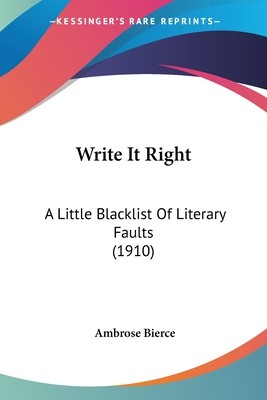
- We will send in 10–14 business days.
- Author: Ambrose Bierce
- Publisher: Kessinger Publishing
- ISBN-10: 0548572321
- ISBN-13: 9780548572320
- Format: 15.2 x 22.9 x 0.5 cm, minkšti viršeliai
- Language: English
- SAVE -10% with code: EXTRA
Reviews
Description
Ambrose Bierce is best known for "The Devil's Dictionary," but the prolific journalist, satirist, and fabulist was also a usage maven. In 1909, he published several hundred of his pet peeves in "Write It Right: A Little Blacklist of Literary Faults."
Bierce's list includes some distinctions still familiar today - the "which-that" rule, "less" vs. "fewer," "lie" and "lay" - but it also abounds in now-forgotten shibboleths: "Ovation," the critics of his time agreed, meant a Roman triumph, not a round of applause. "Reliable" was an ill-formed coinage, not for the discriminating. "Donate" was pretentious, "jeopardize" should be "jeopard," "demean" meant "comport oneself," not "belittle." And Bierce made up a few peeves of his own for good measure. We should say "a coating of paint," he instructed, not "a coat."
To mark the 100th anniversary of "Write It Right," language columnist Jan Freeman has investigated where Bierce's rules and taboos originated, how they've weathered the century since the blacklist, and what lies ahead. Will our language quibbles seem as odd in 2109 as Bierce's do today? From the evidence offered here, it looks like a very good bet.
EXTRA 10 % discount with code: EXTRA
The promotion ends in 23d.05:35:20
The discount code is valid when purchasing from 10 €. Discounts do not stack.
- Author: Ambrose Bierce
- Publisher: Kessinger Publishing
- ISBN-10: 0548572321
- ISBN-13: 9780548572320
- Format: 15.2 x 22.9 x 0.5 cm, minkšti viršeliai
- Language: English English
Ambrose Bierce is best known for "The Devil's Dictionary," but the prolific journalist, satirist, and fabulist was also a usage maven. In 1909, he published several hundred of his pet peeves in "Write It Right: A Little Blacklist of Literary Faults."
Bierce's list includes some distinctions still familiar today - the "which-that" rule, "less" vs. "fewer," "lie" and "lay" - but it also abounds in now-forgotten shibboleths: "Ovation," the critics of his time agreed, meant a Roman triumph, not a round of applause. "Reliable" was an ill-formed coinage, not for the discriminating. "Donate" was pretentious, "jeopardize" should be "jeopard," "demean" meant "comport oneself," not "belittle." And Bierce made up a few peeves of his own for good measure. We should say "a coating of paint," he instructed, not "a coat."
To mark the 100th anniversary of "Write It Right," language columnist Jan Freeman has investigated where Bierce's rules and taboos originated, how they've weathered the century since the blacklist, and what lies ahead. Will our language quibbles seem as odd in 2109 as Bierce's do today? From the evidence offered here, it looks like a very good bet.


Reviews